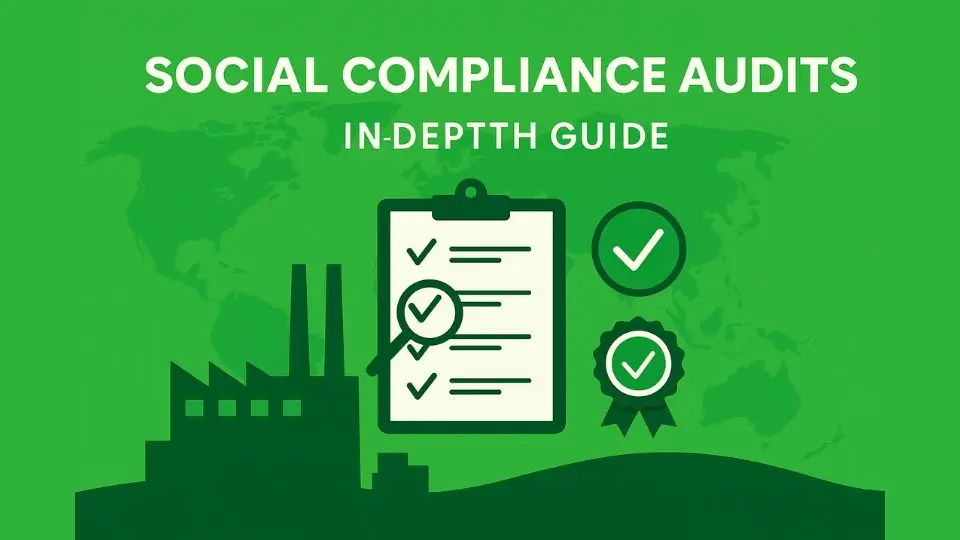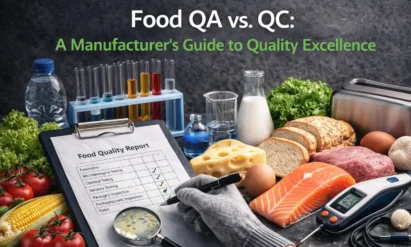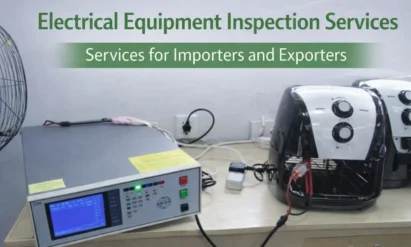In-Depth Guide of Social Compliance Audits
Jun 16,2025
As stakeholders continue to demand greater transparency and accountability around sustainable business practices, social audits have become a critical tool in today’s business landscape.
These audits help companies demonstrate their commitment to ethical and socially responsible practices within their own operations and throughout their supply chains.
For companies that rely on overseas sourcing or outsourced manufacturing, paying close attention to social compliance is especially important. As consumers grow more conscious of the social impact of their purchases, they’re increasingly drawn to products made in a responsible way.
That’s why ensuring suppliers meet high standards isn’t just good practice—it’s a necessary step for importers and businesses engaged in outsourced production.
What Is a Social Audit?
A social audit—also known as a social compliance audit or ethical audit—is an on-site assessment used to verify whether external manufacturers, factories, farms, or packing facilities are adhering to ethical standards. These include social responsibility guidelines, health and safety regulations, and labor laws.
Typically initiated by the buying company, social audits are carried out on suppliers or third-party production sites. For businesses, demonstrating that their products come from ethically compliant supply chains is no longer optional—it’s essential.
These audits ensure that a facility meets the necessary criteria to remain eligible for continued business or sourcing partnerships.
Social audits can be conducted by internal auditors, third-party auditors, or independent inspectors, all of whom are usually required to hold professional certifications.
At QCC INSPECTION, social compliance audits are carried out by certified auditors who conduct thorough on-site evaluations. These include facility walkthroughs, employee interviews, and document reviews, culminating in a transparent audit report.
QCC’s audits not only boost confidence among consumers and stakeholders but also provide concrete evidence that a company’s supply chain aligns with ethical standards.
How Social Compliance Audits Are Conducted
Social compliance audits are typically carried out by independent auditors who follow internationally recognized standards to ensure the process is transparent and impartial.
The specific standards applied may vary depending on the facility’s location and the type of audit required. Commonly used frameworks include:
- SA 8000– One of the world’s leading social certification standards
- SMETA(Sedex Members Ethical Trade Audit)
- amfori BSCI
- Ethical Trading Initiative(ETI) by the International Labour Organization
- Responsible Jewellery Council(RJC)
- Initiative for Compliance and Sustainability(ICS)
Social compliance audits follow a structured, multi-phase approach to ensure a thorough evaluation of a company’s practices and to drive meaningful improvement. Here’s how the process typically unfolds:
Preparation Phase
In this initial stage, auditors review the company’s policies, procedures, and all applicable local and international laws and regulations. If the audit is based on the SA 8000 standard, this phase may also include a self-assessment and preparation for document verification.
On-Site Visit
Auditors conduct a physical inspection of the facility—whether it’s a factory, farm, or packing site. This walkthrough includes checks on health and safety conditions, such as fire prevention systems, chemical storage and handling, emergency exits, and first-aid stations.
Worker Interviews
Auditors speak directly with workers—including vulnerable groups like women and migrant laborers—without any management present. These interviews help assess working conditions and verify whether rights are being respected. Discussions with management and labor brokers may also be held to cross-check information for consistency.
Document Review
Key documents are examined, such as employment contracts, payroll records, time sheets, social insurance documentation, and business licenses. This review is used to confirm compliance with labor laws, occupational health and safety standards, and other legal requirements.
Reporting & Feedback
At the conclusion of the audit, the auditor conducts a closing meeting with management to share preliminary findings. A formal audit report is then prepared, highlighting any non-compliances or gaps, and includes a Corrective Action Plan (CAP) to guide improvements.
Follow-up & Remediation
The company is expected to carry out corrective actions based on the CAP and provide supporting evidence, such as photos, documents, or videos, to demonstrate compliance.
In some cases, a follow-up audit may be required. If corrective actions are successfully completed, the audit report is updated. If not, a new on-site assessment may be necessary.
Together, these steps form a closed-loop system—starting from preparation, continuing through on-site evaluation, interviews, and document checks, and ending with reporting and follow-up.
The goal is to assess and improve a company’s practices in labor rights, health and safety, and human rights. It also ensures the business remains consistently aligned with international standards and regulatory requirements.
What Can Cause a Social Compliance Audit to Fail?
A failed social compliance audit typically indicates that a facility or factory is in serious violation of social responsibility standards or legal requirements.
These violations may breach both local labor laws and internationally recognized ethical standards—and in the eyes of consumers, may be deemed highly unethical. Below are some of the most common and critical issues that can lead to audit failure:
Use of Child Labor
Employing workers who are below the legal minimum working age is a serious violation. Some unethical factories may disregard labor laws and hire underage workers. Regardless of the local legislation, the presence of child labor is a major red flag and can result in an immediate audit failure.
Forced Labor
This includes practices such as confiscating workers’ ID cards or passports, restricting their ability to resign freely, or using debt bondage to control their movements. If workers are not employed voluntarily or are unable to leave at will, it constitutes forced labor—a critical non-compliance issue in any audit.
Unsafe Working Conditions
Auditors closely inspect the physical environment for hazards like unsafe machinery, poor ventilation, inadequate lighting, or a lack of emergency exits and first-aid facilities. If a facility fails to provide workers with basic health and safety protections, it is likely to fail the audit.
Unfair Labor Practices
These include excessive working hours, failure to meet minimum wage requirements, lack of proper overtime pay, and discriminatory or abusive behavior such as sexual harassment, physical punishment, or verbal abuse. Such practices violate social compliance standards and can severely impact the audit outcome.
Inadequate Wages and Benefits
Companies are expected to comply with minimum wage laws and offer reasonable benefits, such as health insurance, paid leave, and other social protections. If a facility cannot meet these basic expectations, it is at high risk of audit failure.
Restricted Freedom of Association
Employees must have the right to freely form or join trade unions and engage in collective bargaining. Any attempts to suppress or interfere with workers’ rights to organize are considered major violations of international labor standards and can result in a failed audit.
Environmental Non-Compliance
Issues such as improper waste disposal, air and water pollution, and the unsafe handling of hazardous chemicals can not only harm the environment and surrounding communities but also lead to legal penalties and failed audit scores.
Bribery and Corruption
In some cases, suppliers may attempt to conceal violations by bribing local authorities or auditors. If an auditing firm discovers evidence of bribery or corrupt practices, the consequences can go beyond a failed audit. Companies may face blacklisting, revocation of certifications, and long-term damage to their reputation.
When an audit fails, the facility is typically given a period to correct the issues by submitting a Corrective Action Plan (CAP) and providing supporting evidence.
However, if remediation efforts are unsuccessful or the company refuses to take action, the consequences can be severe. These may include revoked certifications, canceled orders, or even termination of business relationships.
Why Do Major Brands Need Social Compliance Audits?
Protecting Brand Reputation
A single incident involving labor exploitation, workplace accidents, or environmental violations within the supply chain can seriously damage a brand’s reputation—often in a matter of days.
Social compliance audits allow companies to demonstrate that they’ve conducted proper due diligence and that their products are made legally and ethically.
Meeting Legal and Regulatory Requirements
Governments around the world are introducing stricter laws, such as the Modern Slavery Act and Human Rights Due Diligence legislation, which require companies to monitor and report on their supply chains. Social compliance audits help brands stay compliant with these laws, reducing the risk of legal penalties and regulatory scrutiny.
Reducing Supply Chain Risks
These audits help identify potential issues—such as labor violations, health and safety hazards, bribery, or environmental non-compliance, before they escalate. By spotting these risks early, companies can take corrective action to avoid supply chain disruptions, lawsuits, or financial losses.
Building Trust with Consumers and Investors
Today’s consumers increasingly care about whether products are made under ethical working conditions. At the same time, investors are looking to support companies that align with ESG (Environmental, Social, and Governance) principles.
Conducting regular social audits and being transparent about the results strengthens brand credibility and boosts competitiveness.
Improving Supply Chain Transparency and Operational Efficiency
Social audits often reveal issues like unauthorized subcontracting, underpaid wages, or excessive working hours. With this insight, brands can restructure their supply chains, enhance compliance management, and build stronger, more cooperative relationships with long-term suppliers.
Creating Positive Social Impact
Large brands have the purchasing power and global reach to drive meaningful change. Through social compliance audits, they can help ensure better working conditions, fair wages, and greater respect for workers’ rights across their supply networks. In doing so, they contribute to gender equality, community development, and social progress—not just compliance.
QCC Inspection Supports Businesses with Social Compliance Audits
QCC Inspection conducts thorough social compliance audits that evaluate suppliers’ adherence to labor conditions, health and safety standards, business ethics, and environmental regulations. The goal is to ensure that suppliers comply with both local laws and international standards.
Audit coverage includes areas such as wages and working hours, risks of child labor and forced labor, workplace safety, environmental pollution control, employee welfare, and grievance mechanisms. Evidence is collected through document reviews, worker interviews, and on-site inspections.
Comprehensive audit reports are typically delivered within 48 hours after the site visit, complete with photographs, identified non-compliances, and tailored corrective action recommendations.
This structured and transparent process helps brands proactively manage social compliance risks and improve supply chain sustainability.
Reach out today to learn more about QCC’s social compliance audit services and how they can support your ethical sourcing objectives.
--- END ---
Products
Get A Free Quote
Related Blogs
QCC SAMPLE REPORT
For sample reports or custom checklists, please contact us – we're here to assist you.



 December 31,2025
December 31,2025

